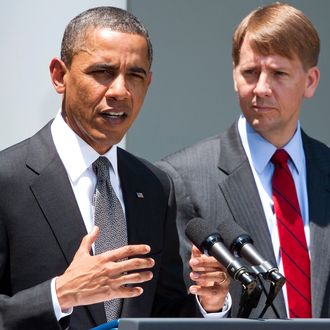
I wrote yesterday about the politics of President Obama’s appointment gambit. (The Senate had been paralyzing agencies by refusing to confirm any appointees and holding sham sessions in order to prevent a recess appointment. Obama made appointments anyway and declared the sham sessions to be a sham.) Beyond the politics, it’s worth considering the merits of this move.
The paramount question is whether or not Obama’s actions are constitutional. I have no idea. Here are a couple law-talkin’ guys making a persuasive-sounding argument that it’s unconstitutional. Here is a law professor making a persuasive-sounding argument that it’s constitutional. I don’t know. I’m not a lawyer, so it’s not hard to marshal legal arguments that sound legit to me. Let’s bracket the constitutional question and think about whether Obama’s move makes the appointment process better or worse.
The Senate ought to have enough influence to prevent radical or unqualified nominees from obtaining positions of power, but not enough influence to block mainstream, qualified nominees. The system can work if the Senate blocks the unacceptable choices and lets the others through. But that depends on a kind of informal power-sharing arrangement, where the Senate has the power to block, but uses it sparingly.
Both parties have grown more aggressive about blocking objectionable nominees. The GOP Senate has taken this dynamic to the next step by openly stating that it will block any candidate at all, however acceptable, unless Obama agrees to change the laws of those agencies more to the Republicans’ liking.
So the alternatives seem to be a system where the Senate can block anybody it wants, or the president can appoint anybody he wants. I’d say the dangers of unlimited obstruction outweigh the dangers of unlimited appointments. (After all, the president won the election, so he ought to generally pick the people who staff the executive branch.) But it would certainly be preferable if there were a way to circumvent abusive obstruction without letting the president seize the kind of nearly unlimited prerogative that Obama is claiming.
The trouble is that such a compromise would require finding a way for the two parties to share power. And it seems that all the procedures that require the sharing of power are breaking down. Electoral politics is a zero-sum competition, and if you hand one of the sides a weapon, you can’t expect them to hold back from using it out of some sense of decorum.
The next step for Obama ought to be figuring out some kind of way to reform the appointment process so that it can screen out extreme or unqualified nominees without screening out everybody. He would never get the Senate to agree to such a reform without breaking its ability to conduct wanton obstruction. Having broken it, he has the leverage to force a compromise, and he should use it.






























